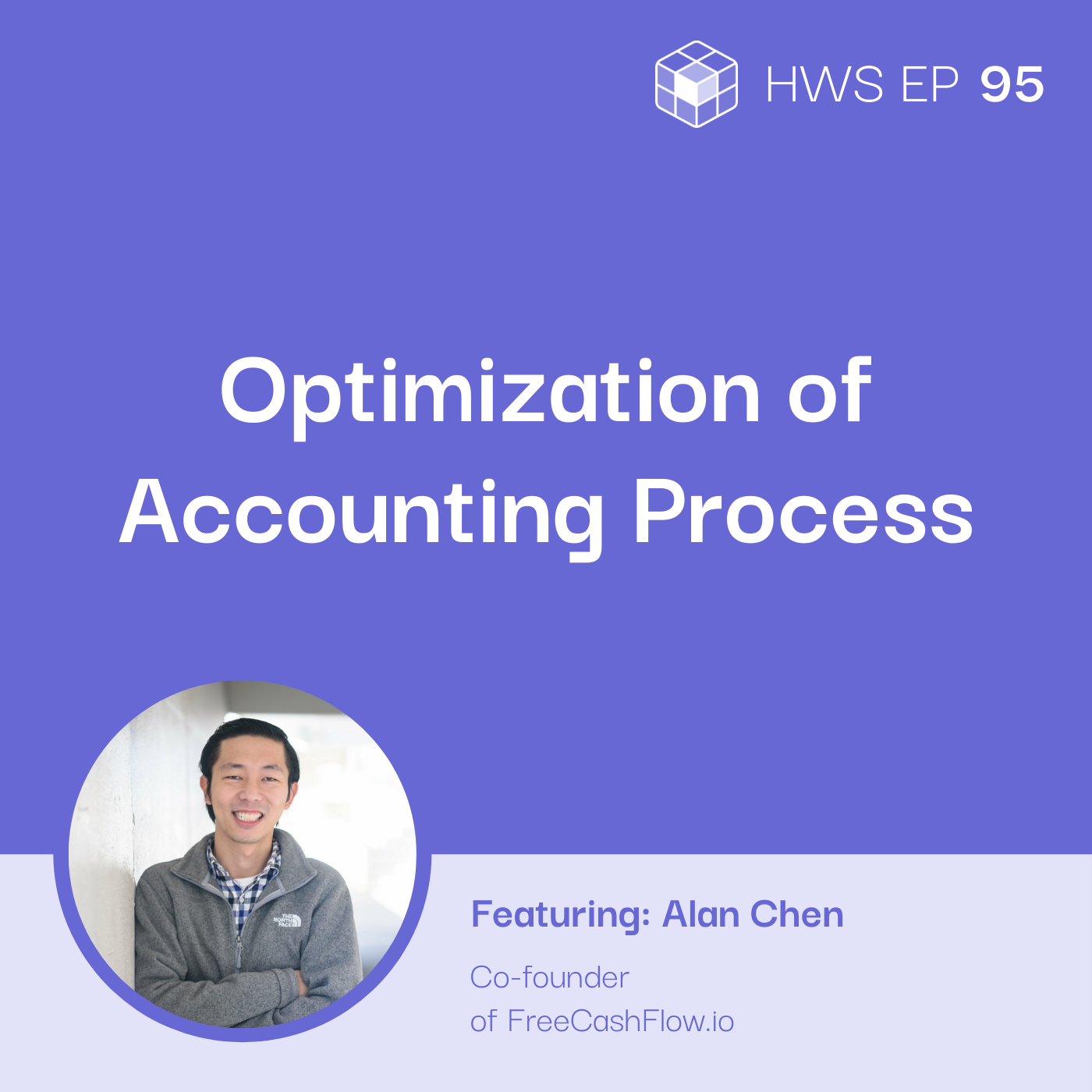Listen on:
Table of Contents:
Problem: How do e-commerce companies optimize their accounting process at different stages of their business, from the regular maintenance work to preparing for exit and valuation?
Many e-commerce companies are challenged with keeping clean books — compliant books, prepared for tax planning, and set up for eventual exits. Online shops can benefit from understanding how money is spent and optimizing cash flow. In spite of all the available input data, businesses must be able to analyze what those numbers mean, and how can they compare their financial performance against others in their industry. From standard maintenance to exit and valuation planning, how do e-commerce companies manage and optimize their accounting process?
What is your burn rate? What is your cashflow? How can you take money out of your business safely while keeping your money running and humming along? Right? Isn’t that one of the biggest worries. Like, ‘Oh man, should I leave all my money in my business?’ What if something catastrophic happened, right? But then you always worry about that. How can you enjoy the fruits of your success? And I think having someone who does the clean booking for you give you that grand view of, ‘Okay, I just need 20,000 a month and my business is humming’. No, worries. It’s a good reserve. The rest of the time, I can, A.) Either go buy that Ferrari I see on Instagram. Or B.) You invest back into the business or into another business. So, you can expand and diversify. Or see, look for other investment vehicles, right? Whether its real estate stocks, bonds, cryptocurrency, very popular choices these days. And you can’t make these decisions while knowing that your business is going to be okay. And that’s really the power of bookkeeping.
Clean Books Means Optimized Data
Freecashflow.io, having access to thousands of data, realized how other e-commerce data could benefit from understanding how they can optimize their business cash flow. Understanding what these numbers mean and learning from how others saved up on unnecessary tax payments, address sales tax compliance when they reach their USD 100,000 mark, and prepare for a possible acquisition or exit. Even with accounting software available, businesses need to apply these numbers to grow and scale. Having well-organized books will help them understand where to grow, where to cut back, and plan for the future.
Software is great. We are not against software at all. We use software at our firm. Software makes things more efficient, more optimized, and just less on the manual labor that goes into things. So, it’s not really a software versus third-party question. It’s more of, are you using the software correctly? Are you taking that data that you pump into the software, and what is the actual output? What is this telling you? I think that’s where the value gain of having someone who’s dedicated to the space you’re in at e-commerce, via tech, via SaaS to really go in and tell you. You have software. You have all the data that you’re feeding into QuickBooks online or Zero right now. What is it telling you? Is it telling you that your margins doing okay? Is it telling you that your trendings are going in the right direction? Are you really using it to do more big data analysis of how your products are looking? What are the winners of your business? What are the losers or those things dragging down your margin?”
Step # 1: Keep regular schedules for bookkeeping
Alan advised businesses to keep their books up to date every month. It is ideal to do this every first week of the following month for businesses earning up to mid-six figures. However, if the operations are still small, it will be more efficient to do it quarterly.
So for many clients, we help them what we call closing the books, right? Which is to make sure that their last month’s expense, revenue, everything is cleaned up for the month. And we do that, usually the first week of the next month. And then we provide them with the necessary financial reports and recommendations. We really just get on a call and let them know what we think about how the price is trending, to help them how to forecast their cash on hand, and things like that. But if you are a smaller business, I think quarterly would be great. I know some businesses look until like a year later, which I don’t recommend,
Step #2: Manage your sales tax well
Managing and avoiding compliance problems requires an understanding of sales tax. There is no federal law that regulates sales tax. The rate of sales tax varies from one place to another, as it is decided by the states. Managing this is a challenge for many e-commerce shops. Even those expanding into Europe find it increasingly difficult to file and pay these taxes. Among the things businesses need to remember is the threshold rule implemented across states. Here are the two most important things to remember when working on your sales tax:
- Aggregate the location of your Shopify customers. Separate the sales tax by location and allocate them accordingly.
- To avoid compliance issues, make sure to pay your sales tax immediately after crossing the USD 100,000.00 mark. Ideally, do it the following month after you’ve hit the mark.
It is based on a new ruling called Economic Nexus, which basically establishes a concentration of sales within a certain state that exceeds the threshold, which is usually at USD 100,000 or 200 transactions.
It’s basically an aggregate download of all your Shopify customers, where they’re located exactly —the zip code they’re in, what city they’re in, what county they’re in. And we break that out into allocations. The point of how much sales you have with this certain region and the state. And this is the threshold rules they have in place. And there are different ones. Some says as soon as you cost it, and you cost to what I call a hundred thousand, which is a very common mark, you have to start paying immediately — the next month.
On Planning a Financially Successful Exit
When you’re poised for acquisition or when you’re ready for an exit, make sure that there’s a third-party looking at your company’s valuation. One that is not the team who’s planning to buy or acquire it. By having someone who regularly check your books, you’re most likely going to end up selling at your target valuation. During this process, it is important to spot issues in the margins, cashflow and projections, which potential buyers can see and ask about.
You want someone else besides just the firm that’s trying to buy your business to look at it. You want to make sure that they’re looking at the same numbers as you are. You want to make sure that they’ll actually understand what your bookkeeping is like. And having someone in your back pocket to do that, I would say, up /your valuation significantly. Given that, you can make the necessary adjustments or changes in your business before you hand your books off to someone else to do that. Especially, if you do have a number in mind, right? Say your goals are always been to sell it for five times, something like that. Are you going to get there, Or you can be disappointed when they come back just two times? And why are you not at five times? What are you doing differently than other businesses who are exiting and dialed those numbers? Is it a margin issue? Is it a cashflow issue? Is it because they don’t see the market trending for your business is going the right direction? There’s a lot of factors in that. And having someone who is third party can figure those out for you. This will let you say, ‘Hey, maybe this is not the best point to sell. Give me another six months to fix up my business’.
How can businesses benefit from proper bookkeeping and tax planning?
“Any client that really thinks about it profoundly and maybe do some pre-planning, we’re seeing them be able to keep another 15 to 20% of their profit back in their pocket. But for someone who is working so hard doing e-commerce, I think that’s a pretty big deal to add to the bottom line to the margins.”
Resources listeners can use to learn about bookkeeping, sales tax, and other accounting concerns:
- Free 30-minutes consultation on accounting strategy
- Free e-commerce tax course
This interview is part of the How We Solve podcast. To hear more from industry experts who are solving everyday business problems, check us out on Spotify, Apple Podcasts, and on our website.
About the guest

Alan Chen
Alan is a Certified Public Accountant and one of the founding partners of FreeCashFlow.io. It’s the leading accounting and consulting agency based out of Los Angeles, California focused on helping one niche only, — those in the e-commerce space. The agency offers services related to business tax planning, sales tax filing and threshold strategies, cloud-based bookkeeping, and smart cash flow allocations to help businesses keep more of the profits made.
Listen on:
